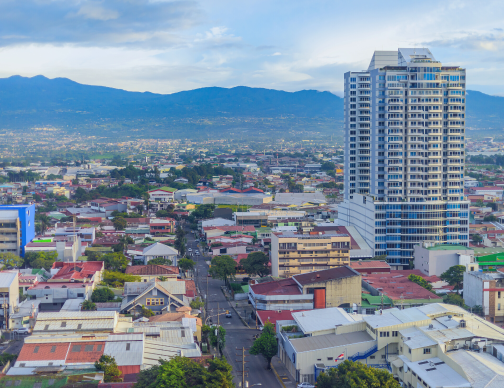Establish your presence globally with Neeyamo as we help you go beyond borders to manage your international payroll and hire new talent in Costa Rica.
Overview
Once covered by 75% rainforests, Costa Rica lost over half to logging. In 1996, they made tree-cutting illegal, launching a restoration plan. Today, 60% of the land is forested, thanks to the dedicated assistance of Costa Rican citizens. The country has achieved nearly zero deforestation levels, establishing Costa Rica as the first nation not only to halt deforestation but also to reverse it.
Do your organization's expansion plans require you to hire employees in Costa Rica? Do you lack a physical entity in the country – a key requisite to hire local talent? Neeyamo - Global Payroll Services assists organizations worldwide with onboarding and managing employees in Costa Rica - processing payroll and payroll accounting, managing local compliance requirements, benefits, and more.
Tools And Instances
Facts And Stats
Capital
San Jose
Currency
Costa Rican Colones (CRC)
Official Language
Spanish
Fiscal Year
1 October (Preceding Year) - 30 September (Current Year)
Date Format
DD/MM/YYYY
Country Calling Code
+506
Other Languages
French, Castellano, English, Creole, Cabécar, Maléku, Buglere, Guaymí
Time Zone
Central Standard Time (UTC-06:00)
Global Payroll
Overview
What is payroll?
Payroll is the list of compensation to be paid to employees of a company or organization for a set period or date. Global payroll provider companies allow organizations to outsource their payroll, allowing employers to focus on other aspects of their business.
What is Global Payroll?
Handling payroll for a widespread workforce can pose a significant challenge for any organization, and the added complication of compliance can make things worse. If companies spend more time processing payroll, it directly impacts day-to-day operations and their overall productivity. The solution to this is to outsource payroll services using the help of global payroll companies such as Neeyamo.
Over the years, Neeyamo – Global Payroll Services has observed these complexities and strived to provide global payroll solutions through a single technology platform – Neeyamo Payroll. Neeyamos global payroll systems ease the process for companies looking to outsource their global payroll requirements and aid them in maneuvering the tricky payroll system in Costa Rica. Neeyamos payroll software provides the perfect solution for all your global payroll needs – for employees working in primary geographies, the long-tail region, remote or internationally located.
Payroll Taxes
Payroll tax is the percentage amount retained from an employee's salary and paid to the government to invest in the general population's welfare. These are statutory in nature and are levied from both the employer and employee. Additional statutory contributions are made by employers towards aiding both short-term and long-term benefits for their employees.
Employee Taxes
Employee Payroll Contributions:
- 5.50% - Healthcare & Maternity (SEM)
- 4.17% - Disability, Old Age & Death Benefits (IVM)
- 1.00% - Contribution from Banco Popular
10.67% - Total Employee Cost
Employee Income Tax:
- 0.00% - 0 – 929,000 CRC Monthly
- 10.00% - 929,001 – 1,363,000 CRC Monthly
- 15.00% - 1,363,001– 2,392,000 CRC Monthly
- 20.00% - 2,392,001 – 4,783,000 CRC Monthly
- 25.00% - 4,783,001 CRC Monthly and above
Employer Taxes
Employer Payroll Contributions
- 9.25% - Healthcare & Maternity (SEM)
- 5.42% - Basic Pension Scheme (IBM)
- 0.25% - Banco Popular Employer Fee
- 5.00% - Family Assignations
- 0.50% - Social Aid (IMAS)
- 1.50% - Training Fund (INA)
- 0.25% - Contribution from Banco Popular
- 1.50% - Labor Capitalization Fund
- 2.00% - Complementary Pension Fund
- 1.00% - National Insurance Institute (INS)
- *5.00% - Solidarity Association (optional, not included in total cost)
26.67% - Total Employment Cost
Payroll Cycle
Overview
Undoubtedly, payroll is a critical process for any organization. The pay cycle in Costa Rica refers to the period for which an organization pays its employees, and this can vary depending on the pay frequency that the organization chooses to adopt.
Frequency
In Costa Rica, salary is paid on a monthly basis and payments must be made no later than the last working day of the month.
13th Month Cycle
The 13th month salary is equal to a month’s pay and should be paid to the employee no later than the 20th of December.
Global Work
Overview
An Employer of Record (EOR) service provider helps you eliminate the hassle of handling complexities while onboarding a new employee in an international location. They help bridge the gap that otherwise mandates organizations to have a local registered entity and a local bank account, prior to making a job offer to an international hire.
An EOR service provider acts as a legal employer, facilitates salary payments, and manages other statutory requirements such as health insurance, payroll taxes, and employee benefits ensuring compliance with local tax laws and regulations.
This allows organizations to focus on collaborating with the employee in Costa Rica for operational tasks, with the knowledge that they have a cost-effective solution to support their global payroll & HR requirements, as they continue their global expansion.
HR Mandates and Practices
Minimum Wage
The Minimum wage with effect from January 1, 2024 in Costa Rica is:
Per Ordinary Daily Working Day (The amounts are in Costa Rican Colon):- Unskilled Worker: CRC 11.953.65
- Semi Skilled Worker: CRC 12.998.72
- Skilled Worker:CRC 13.448.72
- Specialized Worker:CRC 15.613.91
Overtime
In Costa Rica, over 48 hours in a week is considered overtime, and the employee is paid 150% of regular wages. The maximum overtime allowed to be performed daily is 4 hours. Employees are paid 200% of their wage if they work on holidays.
Generally, an employee may not work more than 12 hours per day, including overtime. Employees engaged in dangerous or unhealthy work, as determined by the Ministry of Labor and Social Security, may not work overtime. Additionally, employees who work on days of rest are entitled to double pay for the time worked. Managers, administrators, trustees, and other employees in positions of trust are not eligible for overtime pay.
Data Retention Policy
Generally, in Costa Rica, all returns must be kept for three years. An employer with workers under the age of 18 must keep a record of each worker's name, age, parents or guardians, residence, occupation, work hours, and wages.
Hiring and Onboarding Requirements
Hiring
There are no legal provisions that establish a preference during hiring. If preference is given to individuals or groups of people in the hiring stage, the employer must demonstrate that this decision is made objectively and reasonably.
Onboarding
Typically, the first 30 days of work serve as a probationary period during which either the employer or the employee may terminate the relationship without giving any prior warning. No more than three months should pass during a probationary period.
In Costa Rica, registration with the Social Security system is compulsory for anybody who hires an employee. It becomes the responsibility of the employer to sign up their respective employee with the Social Security Administration.
Prior to registering the employee, it is necessary for the employer to register with the Social Security Administration as an Employer. This can be done either individually or through the name of your corporation.
If the company is located outside of San José, the registration can be done with the Social Security branch nearest to that location.
The following documents need to be submitted if an individual applies for registration:
- The registration application form.
- Copy of the identification document.
- Copy of the identification document of each of the workers you wish to register with Social Security.
Probation
The law does not establish a trial period. The concept of a trial period is often confused with the three-month initial term of contracts, in which it is possible to end the contract without any justification and without the employer having to pay compensation for dismissal, foreseen in articles 28 and 29 of the Labour Code.
However, if a probationary period is established that is justified by the nature of the position, it should be for a reasonable period. In the same way, the objectives that must be met and the evaluations to be practised during this period should be explained to the worker.
Leave
Public Holidays
There are 11 public holidays
- January 1: New Year
- April 6: Maundy Thursday
- April 7: Good Friday
- April 11: Juan Santamaria Day
- May 1: Labor Day
- July 24: Annexation of Guanacaste
- August 14: Mother's Day
- September 15: Independence Day
- December 25: Christmas Day
Effective from May 19, 2020, Aug. 2, Virgen de Los Angeles Day, and a holiday first observed in 2020, Dec. 1, Día de la Abolición del Ejército (Day of the Abolition of the Army), are considered to be holidays, but it is not required to be paid holidays.Oct. 12, Día de las Culturas (Day of Cultures), is no longer considered a holiday.
Annual Leave
Employees are entitled to at least two weeks of paid annual leave after every 50 weeks of work for the same employer. The employer can schedule the employee's vacation at its convenience within 15 weeks of its having been earned. Generally, the employee must be permitted to take the entire vacation at one time. If the employee performs work of a special nature that does not permit a long absence, however, and the employee and the employer agree, annual leave may be split into no more than two segments.
Sick Leave
In Costa Rica, the employer and social security each must pay the employee 50% of their salary for the first three days of sick leave. From the 4th day on, social security pays the employee 60% of their salary, and there is no obligation for the employer to pay.
Employees who have made a contribution to social security in the month before becoming ill are entitled to paid sick leave for up to 365 days. The employer pays the worker 50% of his or her salary for the first three days and the Social Security Fund pays the other 50%.
After the first three days, the Social Security Fund pays the worker 60% of his or her average earnings during the three months prior to the illness. Entitlement to sick leave may extend beyond 365 days in special cases.
Maternity Leave
Female employees receive four months of paid maternity leave, one month of prenatal leave, and three months of postpartum leave.
50% of the payments are paid by the employer, and the other 50% is paid by the CCSS (Costa Rican Social Security Fund).
Employees are entitled to four months of maternity leave—one month before the expected due date and three months after childbirth. In the case of a multiple-birth pregnancy, the leave is extended to 1 month per additional child. The employee receives full pay, half covered by the employer and half by the Social Security Fund.
To obtain paid maternity leave, the employee must provide the employer with a doctor's certificate five weeks prior to the due date.
Women who are breastfeeding are entitled to a 15-minute break every three hours or a 30-minute break twice a day.
An employee who adopts a child is entitled to three months' paid maternity leave beginning on the date after the child arrives. To obtain adoption leave, the employee must submit a certificate from the National Foundation for Children or a family court confirming the adoption.
Paternity Leave
Private sector employees are not entitled to paternity leave. Fathers holding public sector jobs are entitled to eight days of paid paternity leave.
Voting Leave
An employee is entitled to leave for voting purposes with pay, in case the voting hours are within the working hours of the employee.
Termination
Notice Period
In Costa Rica, the notice period is calculated as follows:
- if the employment relationship is between three and six months, the notice period is one week;
- If the employment relationship is between six months and one year, the notice period is 15 days; and
- If it is more than one year, then one month’s notice is required.
Severance Pay
When the worker is dismissed without just cause in contracts for an indefinite period, he or she must be compensated with notice and severance.
The severance must be calculated as follows:
- if the employment relationship is between three and six months, it must be seven days’ pay,
- if it is between six months and one year, it must be 14 days’ pay.
After one year, the following scale is applied:
1 full year: 19.5 days per year worked;
2nd Year: 20 days per year or a fraction greater than six months;
3rd Year: 20.5 days per year or a fraction greater than six months;
4th Year: 21 days per year or a fraction greater than six months;
5th Year: 21.24 days per year or a fraction greater than six months;
6th Year: 21.5 days per year or a fraction greater than six months;
7th Year to 9th Year: 22 days per year or a fraction greater than six months;
10th Year: 21.5 days per year or a fraction greater than six months;
11th Year: 21 days per year or a fraction greater than six months;
12th Year: 20.5 days per year or a fraction greater than six months; and
13 Years and above: 20 days per year or a fraction greater than six months.
The term ‘a fraction greater than six months means that, if the employee has worked for a period greater than six months during a year, a value equal to the scale that corresponds to his or her seniority must be added to the severance payment.
In no case can the compensation be more than the previous eight years of employment, and the maximum seniority that can be recognized for severance pay is eight years. Both the notice and the severance pay are calculated using the average total salary of the previous six-month period worked.
When the worker is dismissed without just cause from a fixed-term contract, he or she must be compensated with a fixed indemnity and compensation (article 31 of the Labor Code).
In fixed-term contracts and for specific occupations, each of the parties may terminate the contract, without just cause, before the advent of the term or the conclusion of the work, paying the other the specific provable damages and losses in relation to the duration of the contract resolved, the importance of the role performed and the difficulty that the worker has in procuring an equivalent position of employment, or that the employer has in finding a substitute, all in the judgment of the labour courts.
When the employer exercises the power referred to above in a fixed-term contract situation, he or she must also pay the worker, at the time of the termination of the contract, an amount corresponding to one day’s salary for every seven days of continuous work executed or percentage of that time; this must be at least three days’ salary.
However, if the contract has been stipulated for six months or more, or the execution of the work, owing to its nature or importance, takes six months or longer, the compensation must be at least 22 days’ salary.
Visa
Overview
Foreigners can enter and stay in Costa Rica with permission from the General Directorate of Migration and Foreigners (this organization is responsible for registering and approving the permanent or temporary residence of visitors who want to work in Costa Rica.)
Depending on the applicant's immigration status and whether they want temporary or permanent residence, different application criteria apply. Organizations may register on behalf of employees.
Companies that register with the General Directorate of Migration and Foreigners may benefit from special treatment, such as shortened processing times for applications for residency. Work without a permit is only permitted for Costa Rican citizens and permanent residents.
The company must demonstrate that no job-seeking Costa Rican natives could fill the post before a prospective employee may start the protracted application procedure for a work permit. The employee needs to submit an application for a provisional visa once this is known.
To enter Costa Rica, you need this visa. People from a few nations do not require a visa to enter Costa Rica, but they must still register with the Costa Rica Consulate in their nation.
The employee must submit a work permit application after arriving in Costa Rica. They must register their fingerprints with the Ministry of Public Security, Ministerio Seguridad Publica, in addition to applying. The Dirección General de Migración y Extranjera, the immigration department that issues work permits for Costa Rica, is where the applicant will submit their application. In accordance with the guidelines established by the Costa Rican Ministry of Labor and Social Security, the department will evaluate the application.
The processing of a work visa for Costa Rica can take three to eight months.
Employee Background Checks
Legal and Background Checks
Every person may request that his or her criminal record be certified for labor purposes. Consequently, the employer can ask the worker for such a certificate as part of the documents that must be submitted during the recruitment process.
However, when it is for labor purposes, the certificate will only indicate the penalties imposed for crimes processed under the special procedures of organized crime, terrorism, sexual crimes against minors, qualified homicide, feminicide, and crimes against the duties of the public function. The certificate will only contain sanctions for sentences served in the previous 10 years. After this, the information will be deleted.
Similarly, if existing penalties against the criminal are found, the Judicial Registry eliminates the sanctions imposed after a certain number of years, depending on the nature of the crime.
The Law for the Protection of the Person Against the Processing of their Personal Data regulates the self-determination of personal information, which is applicable to the employer or to a third party that establishes a database of a personal character that includes the criminal record of the worker.
It is forbidden for medical examinations to check for HIV, AIDS or pregnancy status.
Last updated on August 12, 2024.
If you have any queries or suggestions, reach out to us at irene.jones@neeyamo.com
Heeft u vragen? Neem contact met ons op
Neem contact op met een van onze experts en neem een korte demo van onze diensten







